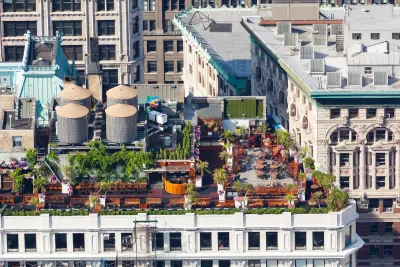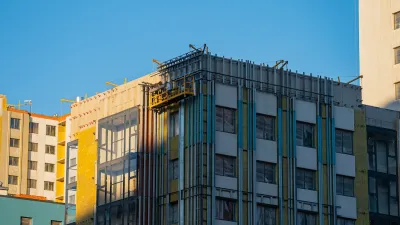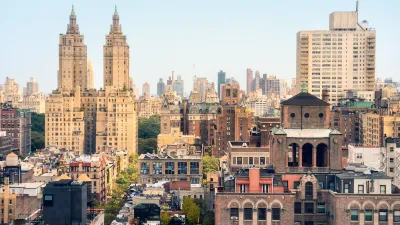The zoning amendment, part of the ‘City of Yes’ plan, will make it easier and more affordable to make efficiency retrofits and reduce emissions.

The New York City council passed a portion of Mayor Eric Adams’ proposed ‘City of Yes’ zoning reform plan, the City of Yes for Carbon Neutrality (COYCN) zoning text amendment, announces Peter Aronson in an article for the New York League of Conservation Voters (NYLCV).
“The change will remove hurdles so the city can more easily make green investments for and changes to its infrastructure that will reduce or eliminate greenhouse gas (GHG) emissions from buildings and the transportation sector, the state’s two leading sources,” the article states. The city’s Local Law 97 calls for buildings over 25,000 square feet to comply with new efficiency standards by 2024, while state law requires an 85 percent reduction in greenhouse gas emissions by 2050.
The NYLCV, which supports the amendment, says the changes will pave the way to more rooftop and parking lot solar panels and more accessible EV charging stations, among other changes.
The plan also streamlines the approval process for efficiency retrofits, “Expands bicycle and e-mobility storage and charging uses by creating a new commercial use for public bicycle and e-mobility parking,” and addresses waste and stormwater, expanding the use of permeable pavement and clarifying regulations around composting and recycling.
FULL STORY: City of Yes for Carbon Neutrality Passes NYC City Council

Planetizen Federal Action Tracker
A weekly monitor of how Trump’s orders and actions are impacting planners and planning in America.

Maui's Vacation Rental Debate Turns Ugly
Verbal attacks, misinformation campaigns and fistfights plague a high-stakes debate to convert thousands of vacation rentals into long-term housing.

Cuomo Is the Candidate of Both NIMBYs and Developers. What Gives?
In the New York City mayoral race, odd bedfellows align to preserve the housing status quo.

The Subversive Car-Free Guide to Trump's Great American Road Trip
Car-free ways to access Chicagoland’s best tourist attractions.

San Antonio and Austin are Fusing Into one Massive Megaregion
The region spanning the two central Texas cities is growing fast, posing challenges for local infrastructure and water supplies.

Charlottesville Temporarily Has No Zoning Code
A judge ordered the Virginia city to throw out its newly revised zoning code, leaving permitting for new development in legal limbo.
Urban Design for Planners 1: Software Tools
This six-course series explores essential urban design concepts using open source software and equips planners with the tools they need to participate fully in the urban design process.
Planning for Universal Design
Learn the tools for implementing Universal Design in planning regulations.
Heyer Gruel & Associates PA
JM Goldson LLC
Custer County Colorado
City of Camden Redevelopment Agency
City of Astoria
Transportation Research & Education Center (TREC) at Portland State University
Jefferson Parish Government
Camden Redevelopment Agency
City of Claremont





























